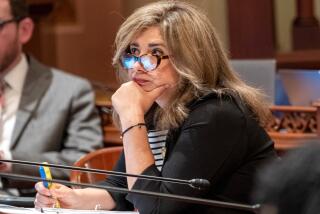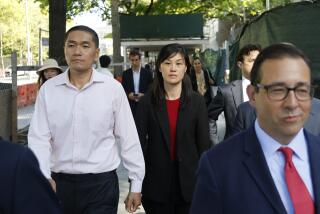Senate Probes Contacts Made by Huang
WASHINGTON — Continuing to probe whether former Commerce Department official John Huang engaged in any nefarious conduct, a Senate committee on Thursday honed in on a steady stream of contacts between the controversial fund-raiser and representatives of his former Indonesia-based employer.
Along with raising questions about the contacts that occurred during Huang’s 17 months at Commerce, the senators puzzled over why he would frequently go across the street from his government office to use a private office that belonged to Stephens Inc. That company is a prominent Arkansas-based financial firm with long-standing ties to the Lippo Group, the Indonesian conglomerate for whom Huang once worked.
The testimony before the Senate Governmental Affairs Committee about Huang’s contacts--which included more than 400 phone calls--and his visits to the Stephens office does little to resolve whether he may have been improperly passing sensitive information to foreign governments, campaign donors or Lippo.
But the details substantially heighten the sense of intrigue surrounding Huang, a central figure in the furor over fund-raising abuses who has maintained a firm silence since the scandal erupted last fall. Thursday’s testimony clearly suggested he was no ordinary bureaucrat or political functionary during his time at the Commerce Department, or later at the Democratic National Committee.
“All these contacts that he had with Lippo are a concern to me, but you can’t draw any conclusions,” said Sen. Joseph I. Lieberman (D-Conn.). “There’s a lot we don’t know.”
But Sen. Susan Collins (R-Maine) said that, at the least, the evidence caused her “to wonder whether Mr. Huang had time to do his Commerce Department business.”
Before Huang joined Commerce, where he served as a deputy assistant secretary, he had been the chief U.S. representative of the Lippo Group, a multibillion-dollar firm with growing investments in China and ties to President Clinton. Lippo is controlled by Mochtar and James T. Riady, longtime friends and financial backers of Clinton dating back to his days as governor of Arkansas. In the late 1970s, Mochtar Riady and Stephens Inc. bought a controlling interest in a Little Rock, Ark., bank.
Huang worked for the Commerce Department from mid-1994 to late 1995. On Thursday, senators were told that during that time, as often as two or three times a week, he crossed Pennsylvania Ave. from his office at Commerce to make calls and pick up faxes and packages from Stephens’ Washington office.
Republicans called it a “secret office.” But several Democrats charged that their GOP colleagues are going too far in assuming sinister motives for this and other aspects of Huang’s behavior.
One of Thursday’s two witnesses, Paula V. Greene, a soft-spoken former Stephens secretary, testified that during regular business hours Huang would occasionally use a spare office. Greene said Huang used it more often than any other visitor, but she did not know who he called or whether he sent any faxes.
Greene said that her boss, lobbyist Vernon Weaver, instructed her to speak directly to Huang at the Commerce Department if there was a fax or package for him.
In an interview, a Stephens spokesman said Huang used the office to send and receive telephone calls and faxes because of his friendship with company officials. “But we have no knowledge of the contents of the calls or faxes,” said spokesman Frank Thomas. A committee source said that Weaver, now U.S. ambassador to the European Union, had only a hazy memory of Huang’s visits.
The committee is focusing on Huang because of what happened after he left Commerce to join the DNC as a fund-raiser. Huang collected $3.4 million for the 1996 campaign, but because of questions about the money’s origins, especially whether it was from foreign sources, the party has returned nearly half of it.
Huang’s visits to the Stephens office were an example of what Republicans regard as suspicious behavior on Huang’s part that gave him the opportunity to pass secret information that he was given at the Commerce Department.
On Wednesday, a CIA official told the committee he briefed Huang 37 times on secret matters concerning Asia.
The committee’s chairman, Sen. Fred Thompson (R-Tenn.), maintained that Huang used the Stephens office “frequently corresponding to times when he had just received briefings on classified material” at Commerce.
To show that Huang was in a position to pass along material, Republicans also introduced a series of charts that spell out his contacts to “Lippo-related individuals,” the times he received access to sensitive material and a list of his White House visits.
John Cobb, a Republican staff counsel who introduced a series of multicolored charts, testified that the data were assembled from documents, telephone records, message pads and depositions.
He told the committee that Huang contacted either Lippo or people with contacts in the firm a total of 439 times during his tenure at Commerce. Democrats, however, charged that Cobb was mischaracterizing some of these contacts by linking them to Lippo.
For instance, Huang was cited as having 61 contacts with Maeley Tom, a Sacramento resident who formerly was a Lippo consultant and long has been active in Democratic politics. In a 1993 letter, she told the White House that Huang was the “top priority for placement” in the new Clinton administration.
On Thursday, Tom’s attorney sent Thompson a letter complaining that portraying her client as a “Lippo-related individual” was “inaccurate and misleading.” Attorney Nancy Luque said Tom’s contacts with Huang were not related to Lippo but were based on their friendship and shared interest in the Asian American community.
The Democrats also complained that the committee’s charts were skewed to smear Huang and advance sinister theories about him that were not proved by the facts.
“Do we know what was said on those calls? Do we know those calls violated the law in any way?” Sen. John Glenn (D-Ohio) asked Cobb.
On another issue, senators continued to clash over the granting of legal immunity to witnesses in exchange for testimony. Thompson sought to give immunity to Keshi Zahn, an Arlington, Va., woman, and four Buddhist nuns--Yi Chu, Man Ho, Man Ya Shi and Suh Jen We--who participated in a controversial 1996 Democratic fund-raiser at a Buddhist temple in Hacienda Heights, Calif. All of the women are suspected of donating money that was not their own.
A vote on whether to grant immunity to the women was postponed until next Tuesday after Democrats said they wanted to hear why the Justice Department opposes such a legal maneuver.
Times researcher Janet Lundblad contributed to this story.
More to Read
Get the L.A. Times Politics newsletter
Deeply reported insights into legislation, politics and policy from Sacramento, Washington and beyond. In your inbox three times per week.
You may occasionally receive promotional content from the Los Angeles Times.










